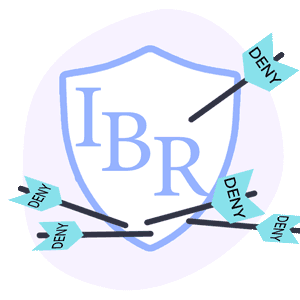Med-Legal Data: IBR Is the QME/AME's Friend

California workers’ comp presents serious challenges to physicians — and Medical-Legal physicians are no exception.
Despite a recently simplified Medical-Legal Fee Schedule (MLFS), claims administrators still manage to routinely, improperly deny and adjust payment to Qualified Medical Evaluators (QMEs) and Agreed Medical Evaluators (AMEs). Often, these denials and adjustments are blatantly invalid. Yet the claims administrator doubles down by refusing to correct their errors when the provider submits a Second Review appeal.
That’s where Independent Bill Review (IBR) comes in.
Data from our managed billing service, daisyCollect, demonstrates just how necessary it is for QMEs and AMEs always to be prepared to request IBR to obtain correct reimbursement. Since California refuses to hold payers accountable, it’s an unfortunate necessity; the amount of revenue recovered via IBR is too significant to ignore.
Read on for the numbers, which prove that any physician conducting Medical-Legal services must know their way around the IBR process to receive correct reimbursement.
IBR: A Medical-Legal Necessity
Looking at the data for our daisyCollect clients, the fact is undeniable: IBR saves QMEs and AMEs a boatload of revenue.
In 2022 so far, Maximus, the private entity which conducts IBR on behalf of the Division of Workers’ Compensation (DWC), issued 117 IBR decisions on disputes over Medical-Legal bills. Of those, Maximus overturned the claims administrator’s improper denial/adjustment 108 times.
That’s Maximus siding with the physician 92% of the time, based on simple de novo* bill review. In other words, when the claims administrator denies or adjusts payment, the claims administrator is almost always wrong. And Maximus almost always recognizes that.
Taking a page from Shakira’s hips, the numbers don’t lie:
2022 Maximus IBR Med-Legal Decisions |
IBR Count |
Percentage |
“Overturn” Decisions (Provider Wins) Count |
108 |
92% |
“Uphold” Decisions (Claims Admin Wins) Count |
9 |
8% |
Total Med-Legal IBRs Maximus Decided Count |
117 |
Why Aren’t More CA Med-Legal Physicians Requesting IBR?
One of the most surprising data points: of the 117 Medical-Legal IBR cases resolved by Maximus in 2022 so far, 43 (37%) were requested by daisyCollect on behalf of our clients.
Those 43 cases involved only 11 physicians — meaning that over a third of all Med-Legal IBR cases in the state came from just those 11 physicians, for whom (collectively) daisyCollect recovered over $76,000. And that’s with 27 pending 2022 IBR cases yet to be adjudicated by Maximus.
Conclusion: California QMEs and AMEs are not utilizing IBR enough.
The $180 fee (which is rarely refunded to the provider), time, resources, and effort necessary to consistently request IBR is prohibitive for many practices. Of course, we understand; daisyCollect exists to handle disputes so the practice doesn’t have to. But any Medical-Legal physician that chooses to forgo IBR is surely leaving money on the table.
Take a look at the daisyCollect-specific numbers below, and the picture is clear.
2022 daisyCollect Med-Legal IBRs |
IBR Count |
Percentage |
Reimbursement Amount |
Total daisyCollect Med-Legal IBRs |
43 |
37% of the Total Med-Legal IBRs filed in California |
$77,171 Disputed |
Maximus “Overturn” IBR Decision Count |
40
|
93% of Med-Legal IBRs filed by daisyCollect |
$76,637 Recovered |
Maximus “Uphold” IBR Decision Count |
3 |
7% of Med-Legal IBRs filed by daisyCollect |
$534 Lost |
Med-Legal Interpreter Services: Know the Game
Of the 43 disputes submitted for IBR by daisyCollect, Maximus refused to overturn the claims administrator’s (incorrect) adjudication three times. All three losses were due to the same unfortunate twist of legalese used by claims administrators like Cannon Cochran to deny payment for MLFS modifier -93.
Modifier -93 increases the normal reimbursement for MLFS billing codes ML201 and ML202 by ten percent for the extra time required when a language interpreter is needed.
As we explained in this post, the MLFS dictates that billing Modifier -93 “requires a description of the circumstances and the increased time required as a result.” While we don’t think it takes Poirot to figure out what “circumstances” make an interpreter necessary, we learned (the hard way) to include the following language in all Medical-Legal reports and appeals with a Modifier -93:
Circumstances Requiring -93 modifier: The injured worker spoke a language different from the language spoken by the evaluator. These circumstances dictated that when the injured worker spoke, the evaluator could not fully understand the worker, and vice-versa, necessitating an interpreter. This increased the time necessary for the evaluation by the amount of time it takes to communicate in two languages.
As mentioned above, daisyCollect has 27 more Medical-Legal bills submitted for IBR for the remainder of 2022, totaling over $50,000 in disputed reimbursement.
We expect the final rate of “overturn” decisions for daisyCollect physicians in 2022 to exceed the current 93%. Combined with the astonishing amount of overall workers’ comp revenue saved through Second Review appeals, our Med-Legal IBR data makes it clear that correct fee schedule reimbursement is something physicians cannot expect in California, but must be willing to fight for.
*Rather than delving into the respective arguments made by the physician and claims administrator, Maximus resolves IBR disputes by acting as a bill reviewer, adjudicating the entire bill from scratch. Essentially, the provider pays $180 for Maximus to review a bill that the claims administrator’s bill review failed to properly adjudicate (and there are no consequences to the claims administrator for failing to adjudicate the bill in the first place correctly).
Med-Legal billing requires specialized expertise. daisyCollect professionals use our advanced software (and years of experience) to protect your practice. Learn more and request a demo below:
LEARN MORE
DaisyBill provides content as an insightful service to its readers and clients. It does not offer legal advice and cannot guarantee the accuracy or suitability of its content for a particular purpose.






